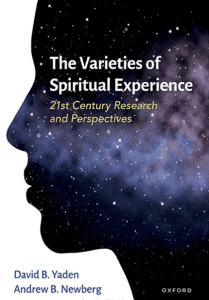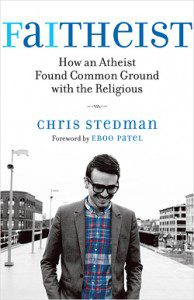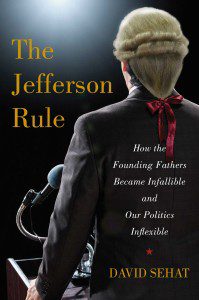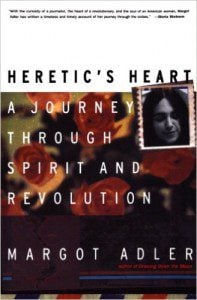A few months ago, I wrote a post on “Poetically Dwelling on the Earth as a Mortal,” which was in honor of my favorite undergraduate philosophy professor, James Edwards. Dr. Edwards was the most well-known, articulate, and matter-of-fact of atheist at my college. And suffice it to say that in the late 1990s in South Carolina there were very few “out” atheists. I had a few good friends in high school that were self-professed agnostics, but Dr. Edwards was — if not the first atheist I knew well — then certainly the first atheist I met who made atheism seem like a serious, well-considered worldview that a healthy, thoughtful, compassionate adult could choose.
A decade after I first met Dr. Edwards, the climate for atheism in the United States began to shift. In 2004, Sam Harris published The End of Faith: Religion, Terror, and the Future of Reason, which became a major New York Times bestseller. Two years later saw another major bestseller with Richard Dawkins’ The God Delusion. That same year Daniel Dennett published Breaking the Spell: Religion as a Natural Phenomenon. Another major atheistic bestseller appeared in 2007: Christopher Hitchens’ God Is Not Great: How Religion Poisons Everything.
There are other important representatives of the contemporary atheism movement, but in particular, Harris, Dawkins, Dennett, and the now-late Christopher Hitchens have been jokingly referred to as “The Four Horsemen of the Non-apocalypse.” I should probably also hasten to add that what is most significant about these so-called “New Atheists” is not anything particularly original about their ideas (their ideas are, for the most part, contemporary updates of perspectives that can be traced through more than 2,000 years of free thinkers in various cultures); rather, what is new and significant is a growing public interest in atheist arguments, creating multiple, major popular bestsellers about atheism. As a result, many individuals and groups are feeling more emboldened to privately and publicly question traditional religious claims. One symbol of this shift is a large scarlet red “A,” playing on Hawthorne’s Scarlet Letter, but intended here in the twenty-first century to mark not a shameful “A” for adultery, but a proud “A” denoting that one is “out” as an Atheist.
Where, then, do we find ourselves a decade after Harris’ first book in what became the unexpected trend in bestselling books on atheism? In October 2013, the Pew Research Center reported that, “2.4% of American adults say they are atheists when asked about their religious identity, up from 1.6% in 2007.” Importantly, though, what self-identified atheists mean with the label “atheist” varies. For instance, “14% of those who call themselves atheists also say they believe in God or a universal spirit.” My best guess at explaining that discrepancy is that those poll respondents are saying that they are an atheist in regard to disbelief in the God of traditional theism, who (to be frank) can sound a lot like an old bearded white man — like Santa Claus or Zeus — sitting up there on the other side of the sky looking down on us. At the same time those 14% of “atheists” do potentially believe in “God” as a universal spirit. (For similar reasons, many Unitarian Universalists feel more comfortable substituting the word God for words like “Spirit of Life,” “Spirit of Love and Mystery” — or simply “the Sacred” or “the Divine.”)
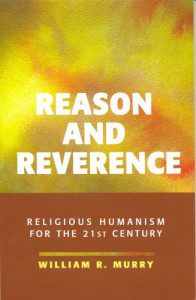 The Pew poll results continue with some further statistics that I see as hopeful for the future of progressive religion:
The Pew poll results continue with some further statistics that I see as hopeful for the future of progressive religion:
Not all atheists see a contradiction between atheism and spirituality. A quarter (26%) say they think of themselves as spiritual people, and 3% consider themselves religious people. Four-in-ten atheists (41%) say they often think about the meaning and purpose of life. Among atheists, 82% say they either often (52%) or sometimes (30%) feel a deep connection with nature and the earth.
This perspective is sometimes called “Religious Humanism,” which emphasizes awe and respect for this life and this world over concerns about an “afterlife” or religious traditions which seem obsolete in light of twenty-first century knowledge about the universe.
Presumably in response to the burgeoning numbers of “out” atheists in the U.S., a significant inclusion back in 2009 in President Obama’s First Inaugural Address was the president saying, “We are a nation of Christians and Muslims, Jews and Hindus, and non-believers.” In contrast to the traditional formulation of the U.S. as a Judeo-Christian nation, President Obama’s choice of words recognized both our nation’s growing religious pluralism (“Christians and Muslims, Jews and Hindus”) as well as the increasing numbers of “non-believers.”
In recent years, a related practice in some progressive Christian circles is known as Atheism for Lent. (Giving up “God” for Lent.”) Not to be confused with “l-i-n-t” that you find in your dryer, “L-e-n-t” is from the Old English lectern, which means “springtime” and is related to the old Anglo-Saxon word for “lengthen,” as in the lengthening of days. And in the Christian liturgical calendar, Lent refers to the 40-days before Easter Sunday in which the period of daylight is lengthening each day. The 40-day period of Lent is traditionally a time of self-discipline, self-examination, and spiritual practices in preparation for the celebration of Easter and in imitation of the forty days that Jesus spent in the wilderness being tempted and tested prior to his baptism and the beginning of his public ministry (Mark 1:12-13; Matthew 4:1-11).
Atheism for Lent is a sort of postmodern variation on that tradition “in which a group of people work through forty reflections over the Lenten period made up of many of the greatest, most perceptive criticisms and critiques of God, religion, and faith” to clear away false beliefs and practices in preparation for a more honest and authentic celebration of renewal at Easter.
And contrary to many popular conception of Christianity, the spiritual practice of doubt is central to the Christian tradition. To name only the most prominent example, according to Mark, the earliest of the canonical Gospels, Jesus cried out in existential despair during his crucifixion, “My God, my God, why have you forsaken me?” Indeed, the poignance of these words from Jesus is underscored by them being rendered not in the language of common Greek (as is most of the Christian Scripture, due to its context of being written in the Greco-Roman Empire), but instead in Aramaic, the language a Jewish peasant such as the historical Jesus would have spoken. Mark 15:34 says explicitly that, “ Jesus cried out with a loud voice, ‘Eloi, Eloi, lema sabachthani?’ which means, ‘My God, my God, why have you forsaken me?’” That cry of doubt is at the heart of the Christian tradition.
Despite the import role of doubt in the Christian tradition, if you are curious about what it might feel like to experiment with “Atheism for Lent,” I would not recommend that you turn first to the “New Atheists.” Although their books are popular bestsellers in recent years, the opinion of both myself and of many other commentators is that, as a whole, most of the New Atheists are strident, arrogant, mean-spirited, and dismissive not only to religious fundamentalists, but also to anyone who seeks to carve out a more nuanced middle ground related to religion. To be fair, I can sympathize with their approach in part because many New Atheists feel embattled from so many years of cultural dominance by “Christian Supremacists,” who want the U.S. to be an exclusively Christian nation. Nevertheless, I find the tone of the New Atheists to be in many ways an unhelpful form of reactionary secular fundamentalism. And as I have said before, my own proclivities lie in the middle ground of seeking to draw from both religion and science, mysticism and humanism.
Moreover, John Haught (a senior religion professor at Georgetown University, who specializes in the intersection of religion and science and who for many years taught a course on “The Problem of God”) has said that, “The recent books by Dawkins, Harris and Hitchens would never have made the required reading list [for my course]. Their tirades would simply reinforce students’ ignorance not only of religion but also of atheism.” Haught calls them proponents of “Soft-core Atheism” because their work is so “bland” and shallow compared to the landmark criticisms of hard-core atheists such as Karl Marx (1818-1883), Friedrich Nietzsche (1844-1900), and Sigmund Freud (1856-1939).
Long before Harris, Dawkins, Dennett, and Hitchens were deemed “The Four Horsemen of the Non-apocalypse,” Marx, Nietzsche, and Freud were known as the “Masters of Suspicion,” referring to a way of interpreting texts with a skeptical approach that seeks to unmask underlying biases and unconscious motivations. And although a small library could be filled with the books that have been written about each of these masters of suspicion, the following is a brief summary of their basic critiques.
Marx sees religion as “the sigh of the economically distressed” that primarily serves to “legitimize” the current unequal distribution of “socio-economic power.” So, for Marx, we need to unmask that “underneath” the religious impulse is really about our dissatisfaction with the unfair economic playing field. (Since we don’t see any way to change that inequality, we placate ourselves with religion.) His contention is that by exposing the ways that religion is merely an “opiate of the masses,” we can free ourselves to focus on creating a fair economic system for all. In his famous words, “Workers of the world, unite!”…and #OccupyWallStreet. (Okay, I added that last part!)
The second “Master of Suspicion,” Nietzsche, sees religion as the “resentment of the weak against the strong,” as the weak trying to control those who are strong. So we need to unmask the ways the religion is holding back the greatest among us from achieving their fullest potential in overcoming the limitations of traditional morality and becoming what he called the Übermensch (“Beyond Human”).
Finally, Freud sees religion as existential “weakness seeking consolation.” Put more baldly, Freud sees the root of religion as “a desire for one’s mommy” — that the felt longing for the Presence of God is really about the unconscious desire to return to the “Oceanic Feeling” of the womb.
But each of these three renown “Masters of Suspicion” owes a tremendous debt to an earlier — but today less well-known — professor of religion named Ludwig Feuerbach (1804-1872). As Friedrich Engels, Marx’s famous collaborator, said, “we all became Feuerbachians.”
More than 150 years before the first of today’s New Atheists broke onto the New York Times bestseller list, Feuerbach’s 1841 book The Essence of Christianity “quickly became a public sensation in the German-speaking world.” (Fascinatingly, the English translation of Feuerbach’s book was done by George Eliot, author of the classic novel Middlemarch.) As one historian of religion puts it:
Feuerbach argued that all statements that…theologians make about God are in actual fact statements made about human nature as a species. In a word (really two words), they are psychological projections. Put in the form of one of his most famous refrains, “the true sense of theology is Anthropology”…all claims made about “God” are in actual fact reflections or projections of “[Humanity].”
Thus, Feuerbach provocatively proposed that the key to unlocking the underlying truth of the human religious impulse was to reverse the subject and predicate of traditional religious claims in order to reverse (and claim for ourselves) the unconscious truths we had formerly projected on to the divine. So, he writes, that, “If [Jewish scripture] states that ‘God made [humans] in [God’s] own image,’ what this really means is ‘[Humans] made God in [humanity’s] own image,’ or if Christianity states that ‘God is love,’ what this in essence means is ‘Love is God.’” In other words, we humans unconsciously sensed the truth of love’s central importance to the human condition, and projected that truth onto “God” (“God is love”), but the invitation — once we become aware of that dynamic of psychological projection — is to let go to the “crutch” of needing to see “God is Love” and claim that truth for ourselves: “Love should be an Ultimate Concern for humans.”
Similarly, Peter Rollins in his book The Orthodox Heretic and Other Impossible Tales tells a parable about a gifted 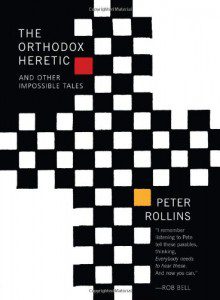 philosophy professor who dedicates his life’s work to “proving once and for all the non-existence of God.” But even after decades of tireless work, he
philosophy professor who dedicates his life’s work to “proving once and for all the non-existence of God.” But even after decades of tireless work, he
had slowly begun to despair of ever completing his life project. Then, late one evening while he was locked away in his study, bent wearily over his old oak desk surrounded by a vast sea of books; he felt a deep stillness descend upon the room. As he sat there motionless everything around him seemed to radiate an inexpressible light and warmth. Then, deep in his heart he heard the voice of God address him, “Dear friend, the task you have set yourself is a futile one. I have watched on all these years as you pour your being into this endless task. Yet you fail to understand that your project can only be finished with my help. Your dedication and single mindedness has not gone unnoticed and it has won my respect. As such I will tell you a sacred secret meant only for a few… dear friend, I do not exist” Then, all of a sudden, everything appeared as it was before and the philosopher was left sitting at his desk with a deep smile breaking across his face. He put his pen away and left his study never to return. Instead he joined a monastery where he saw out the last of his days in gratitude to God for helping him complete his lifelong project.
To use a Feuerbachian lens to interpret this story, when the atheist professor heard ‘God’ say, “Dear friend, I do not exist,” that divine voice was his psychological projection of what he most deeply needed to hear said, which, in turn, freed him from his unhealthy “complex” (his unhealthy obsession) with disproving arguments for the existence of “God,” and allowing him to dedicate his remaining years to the self-transcending practice of serving the poor.
This connection between theology and anthropology is one of the reasons that the classic UU curriculum “Building Your Own Theology” starts not with studying traditional theologies from the past (that comes at the midpoint), but — in good Feuerbachian style — with autobiography (with “Anthropology”): becoming more conscious of how much your life story and your firsthand experience affects, shapes, and informs how you construct theology. Again, in Feuerbach’s words, “the true sense of theology is Anthropology”…all claims made about “God” are in actual fact reflections or projections of “[Humanity].”
At the same time, just as there is “nothing new under the sun” with the New Atheists, there is a sense in which the basic Feuerbachian insight was expressed at least as early as the ancient Greek Pre-Socratic philosophers. More than 2,500 years ago the philosopher Xenophanes noted that it was no coincidence that, “the Ethiopians worship black gods and the Thracians worship gods with blue eyes and red hair….” And that, “If oxen, horses, and lions had religion (and hands), they would no doubt paint their gods to look like oxen, horses, and lions.” The dangerous contemporary corollary, of course, is when individuals and groups take the psychological biases they have projected onto God literally, they use that as a sacred mandate to turn their misogyny, racism, and homophobia into what they view as “divinely-ordained” sexist, racist, and heterosexist laws. Or one Christian theology has sharply put it:
we transform the covenant formula, “I will be your God, and you will be my people,” into a vehicle for making God our personal property. (This can happen at the national as well as at the denominational level. Thus, Iran, Israel, and the United States represent Islamic, Jewish, and Christian versions of what might be called possessive monotheism, at least in the practices of some of their most devoutly religious citizens.) We thus become the definition of the good and the saved, making those who differ from us into the wicked and the lost. If we are among those who preside over the sacramental rites of our faith, we become the dispensers or withholders of divine favor.
That scenario is how books get censored and people get burned at the stake. However, as I posted about last week in regard to the need for Evolutionary Religion, there are many compelling reasons and appropriate times to take ancient theologies seriously, metaphorically, and archetypally, but we often go awry when flat-earth metaphors and theories are taken literally.
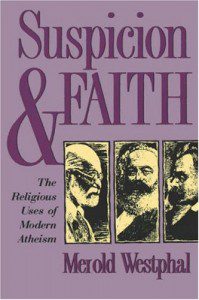 But here’s where it gets really interesting. Feuerbach says further that, “what today is atheism, tomorrow will be religion.” What Feuerbach means is parallel to what many progressive practitioners of religion are seeking through the practice of “Atheism for Lent.” One theologian calls it “The Religious Uses of Modern Atheism”: uprooting the unconscious “self-deceptions” of religious traditions. Rejecting the false idolatries that atheism rightly exposes can ironically lead to a more mature understanding and experience of “God” or “Spirit.” Remember those respondents in the Pew Research poll who both identified as atheists and also believe in God or a universal spirit? A legitimate question is, therefore, “What understanding of “God,” “Spirit,” or “theism” are you rejecting with your a/theism?” One political theologian puts it this way:
But here’s where it gets really interesting. Feuerbach says further that, “what today is atheism, tomorrow will be religion.” What Feuerbach means is parallel to what many progressive practitioners of religion are seeking through the practice of “Atheism for Lent.” One theologian calls it “The Religious Uses of Modern Atheism”: uprooting the unconscious “self-deceptions” of religious traditions. Rejecting the false idolatries that atheism rightly exposes can ironically lead to a more mature understanding and experience of “God” or “Spirit.” Remember those respondents in the Pew Research poll who both identified as atheists and also believe in God or a universal spirit? A legitimate question is, therefore, “What understanding of “God,” “Spirit,” or “theism” are you rejecting with your a/theism?” One political theologian puts it this way:
the new atheists must choose what god it is they attack. Is it the God of the mystics, the followers of the Social Gospel, the eighteenth-century deists, the Quakers, the liberation theologians, or the stern God of the patriarchs? Are they at war with Thomas Aquinas or John Calvin or Mohandas Gandhi or Thomas Merton or Paul Tillich?
Or as one contemporary philosopher says about his work that seeks to take the criticisms of the hardcore atheists very seriously: “I am trying to open thinking and practice to the event that is playing itself out under the name of God.”
This year Lent begins on Ash Wednesday, March 5.
For those forty days preceding Easter, if you are drawn toward theism — to the Spirit of Life, the Sacred, the Divine — I invite you to reflect on what it might mean to experiment with “the spiritual practice of doubt.”
If you are drawn toward atheism, what might it mean for you to “open thinking and practice to the event that is playing itself out under the name of God?”
(If you want to explore these ideas and practices more in depth as part of a group, there is a 6-week online Atheism for Lent course in which I will be participating as a student.)
Notes
- The three paragraphs summarizing Marx, Nietzsche, and Freud are adapted from Merold Westphal, Suspicion and Faith: The Religious Uses of Modern Atheism, 229 and John D Caputo, The Insistence of God: A Theology of Perhaps (Indiana Series in the Philosophy of Religion), 98.
- “we all became Feuerbachians” — Jeffrey J. Kripal, The Serpent’s Gift: Gnostic Reflections on the Study of Religion, 63.
- “quickly became a public sensation” — Kripal, 60.
- “If [Jewish scripture] states that ‘God made man…” — Kripal, 65.
- “the Ethiopians worship black gods….” — Kripal, 63-64.
- “we transform the covenant formula…” — Westphal, 109.
- “what today is atheism, tomorrow will be religion.” — Chris Hedges, I Don’t Believe in Atheists, epigram.
- “the new atheists must choose” — Chris Hedges, I Don’t Believe in Atheists, 26.
- “I am trying to open thinking and practice” — Caputo, 10.
For Further Reading
- Carl Gregg, “Why Is There Something Instead of Nothing?” available at http://www.patheos.com/blogs/carlgregg/2013/03/why-is-there-something-instead-of-nothing/.
- Van A. Harvey, Feuerbach and the Interpretation of Religion(Cambridge Studies in Religion and Critical Thought).
The Rev. Dr. Carl Gregg is a trained spiritual director, a D.Min. graduate of San Francisco Theological Seminary, and the minister of the Unitarian Universalist Congregation of Frederick, Maryland. Follow him on Facebook (facebook.com/carlgregg) and Twitter (@carlgregg).
Learn more about Unitarian Universalism:
http://www.uua.org/beliefs/principles



